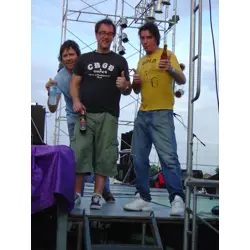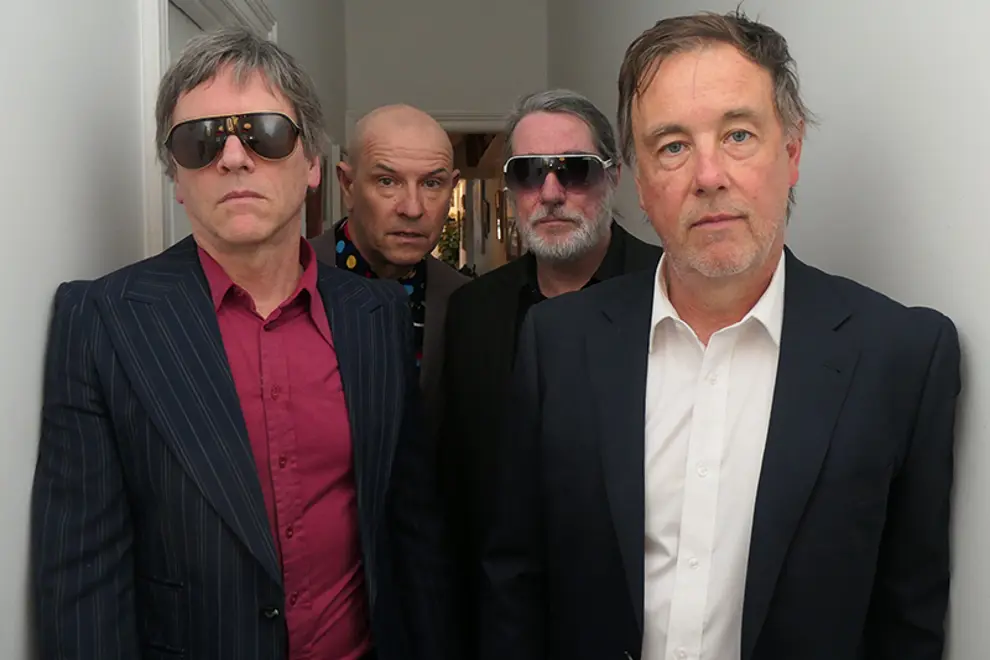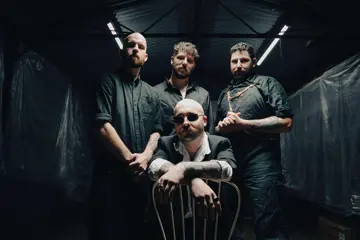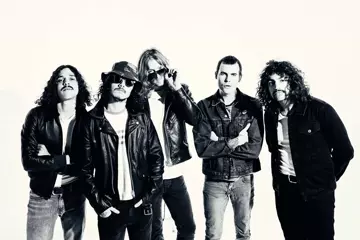 The Fauves
The FauvesIt’s now been more than 35 years since four young schoolmates on the Mornington Peninsula just south-east of Melbourne played their first gig at a local footy club, naming themselves The Fauves after an obscure French art movement of which precisely none of that inaugural audience was aware.
Over the ensuing decades, they’ve consistently kept making such decisions for their own amusement, along the way experiencing both the thrilling highs and crushing lows of the music industry - rising from relative obscurity to the major-label highlife in the mid-90s before returning to the independent realms at the turn of the millennium - facing every success and hurdle with the same self-deprecating cynicism, their music always distinctly uncontrived regardless of their current situation.
NEW HORIZONS
The Fauves’ distinctive aesthetic is an ever-evolving take on catchy indie rock that’s rife with memorable hooks and melodies, as well as vaguely surreal and sometimes ironic lyrics which are usually found honed with laser-like precision at a past or present aspect of Australian society deemed worthy of their collective satire or scorn.
Their brand new 13th album, Tropical Strength, is certainly no outlier in that regard, those sardonic worldviews and sensibilities still firmly intact, in other places lulling us into a false sense of security by breezily evoking a fuzzy sense of nostalgia for a more innocent time.
Don't miss a beat with our FREE daily newsletter
It’s an unflinchingly excellent batch of songs—the best Fauves album in many moons amidst a routinely strong and consistent canon—one that found them decamping to Bali for the recording sessions. The Indonesian tourist haven is an exotic locale more often associated musically with bootleg CDs than cutting-edge studios, but such is the world of The Fauves.
“I don’t think going to Bali affected the actual record; it was really for fun, just a stupid thing to do,” smiles founding co-frontman Andrew Cox. “Until now, we’ve mostly recorded our albums in Melbourne - maybe one or two in Sydney along the way - and it just seemed we had a bit of money sitting in the band account from some shows that we'd just left there for a rainy day, so we thought we’d just do something just different and turn it into a half-work thing, half-holiday.
“I mean, that's sort of what we're about now. It's more about the experience, I suppose, of being in a band and making it as fun as possible. And so that's why we thought, ‘Yeah, Bali’. We had a studio booked, and that fell through at the last minute - a bigger kind of more flash studio than where we ended up - and we had all our flights booked and everything, so we're like, ‘Shit, it's all falling apart!’
“Then we just found this little place on the outskirts of Denpasar, and it was super cheap. It was a bit of a gamble, I suppose, in that we didn't really know what we were gonna find when we got there, but it was a great little place, and everything worked.
“Realistically, I don't think it really affected the recording or changed the sound - the way the record would have turned out - but it was just a great experience and really worth it.”
One advantage The Fauves had as they headed overseas to record was that there was certainly no dearth of songs, with around 40 potential candidates in the back pocket as they settled down to attack Tropical Strength.
“Thinking back, we generally have that with most records,” Cox tells. “We just do heaps of demos because these days there's sort of an increasing gap in time between albums. Back when we were on record labels, we'd sort of put out a record at least once every two years, but now logistically, there’s a bit more work involved - getting the money together and everything - because obviously, we’re much more self-funded these days.
“So across those intervening periods, we just tend to write a lot of songs and then kind of demo them up and go through the unwieldy process of trying to work out which ones everyone likes. So generally, you have sort of six or seven that everyone's really agreed on, and then we have to kind of get a little bit more nasty to sort of sort through the last four or five that are gonna go on there.
“It felt like a strong batch heading over there, but I guess it's part of being in a band and writing songs that you sort of have to have that critical faculty to be able to go, ‘No, this one's no good’. But you also kind of have to deceive yourself a little bit when you're writing all these songs; you think, ‘Oh, they're great, they're all fantastic!’ And then often it takes time, I suppose, to get that bit more perspective.
“But there were heaps of other songs that we demoed that I would have been happy to put on the record, we were just in a kind of sweet spot, I think. So, yeah, if it hadn't been these songs, I would have been happy with a number of others that we wrote. I felt from the get-go that we had a strong base to work from.”
FRUIT OF THE LABOUR
The album’s lead track and lead single is the wonderfully acerbic un-Australians, a track taking potshots at those patriotic souls in our midst unwilling to either compromise their worldview to cater for the changing world nor admit that our sunburnt country mightn’t be entirely devoid of foibles.
The song reels off an incredible (and hilarious) array of hot-button topics in order to make its point, and is sure to ruffle some more conservatively-inclined feathers (assuming they ever get the opportunity to hear it).
“Yeah, that’s kinda what I was going for,” Cox laughs. “As I was writing the lyrics I was thinking, ‘Yeah, this is probably going to annoy a lot of people’, I guess I just like that idea I suppose. And it seemed like such a natural way to lead off to the record, the way it sort of comes in - it’s a while until the singing starts, it just sort of builds up - so it just seemed like the natural opener to us.
“But, yeah, it's good to stir things up a little once every now and again. We’ve done that a few times with a few songs over the years, but this is probably the most overt pot-stirrer that we’ve put out there in quite some time."
Then there are more overtly nostalgic numbers like Moscow Olympics—with its cavalcade of ‘80s imagery, such as frozen Sunnyboys and coin-operated public phones—and Only Wait Forever, which revives the spectre of long-lost airline TAA as well as ‘one-hit wonder’ Plastic Bertrand (and those public phones again).
“Those touchstones are something that's been there in my lyrics a lot, I suppose,” Cox reflects. “I love that, looking back to those eras and just the sort of evocative imagery and remembering back to a more innocent time.
“There's a lot of that stuff, I suppose, even way back on [1996 third album] Future Spa - sort of on [1998 fourth album] Lazy Highways too, probably - I was referencing those really strong memories of things that stay with you from when you're growing up.
“And I suppose as you become more and more an old bastard, that reminiscing nostalgia thing becomes even more prominent, so we're probably really showing our age there - well, we definitely are with some of the lyrical references.
“But equally, our audience has kind of grown up with us, so they're all probably in a similar place. So I think they’re gonna probably get it, whereas 20-year-olds are gonna be kind of scratching their heads, like, ‘What are these guys on about?’ But, yeah, the people on The Fauves’ journey are going to be more likely to get what's going on, I suppose.”
There are other more obvious songs about the pitfalls of growing old and mortality on Tropical Strength in the shape of the openly disturbing If You Love Me and the slightly morbid closer Let Me Stop You There.
“Oh yeah, they're quite dark songs, but I don’t mind going there,” Cox admits. “These days, popular culture is so associated with youth, so I like the perverse idea of really flaunting our age and not kind of shrinking away from it and it just being kind of really upfront. You know, we're middle-aged people now and so the lyrical concerns kind of really reflect that, I think.
“If You Love Me is particularly dark, I guess. I live on my own and, you know, you start thinking, ‘Jesus, what if something happened to me?’, and it kind of just went from there.
"I mean, there's an element of humour - very dark humour - in there as well, obviously. But I think you've got to write stuff that kind of means something to you or reflects who you are at that time and place, so that's why we sort of go that way in our lyrics.”
NO LAUGHING MATTER
Alongside self-deprecation, humour has always been a massive part of The Fauves’ armoury, whether lurking in the lyrics of their songs or found in accompanying detritus like their hilarious videos, press releases and even the fanzine that they used to publish in the early years of the band.
"We've never wanted the humour side to overshadow our music, and people have probably perceived it that way at times,” Cox reflects. “But we've just always really struggled, I guess, to take it all seriously. We take the music really seriously, but in terms of ourselves as people, we've really struggled to present ourselves in a really serious, deep, artistic way.
“That humour is also a defence mechanism a little bit. We take our band really seriously, but I don't think we take ourselves that seriously. It just feels a bit stupid to be sort of handing out a press release like it was sort of handed down to Moses from God above. Also, we’re keeping in mind that people have to read a lot of press releases, and we just try to be slightly entertaining.
“So yeah, it's trying to juggle that thing and find the balance because we've never really wanted to be known as a funny band, but there's definitely humour involved. I mean, humour is a legitimate part of artistic endeavour anyway. Even somebody who's perceived as being really serious, say someone like Nick Cave, has definite humour running through parts of his work, in a way it’s probably a pretty Australian thing.
“I mean, the humour style is pretty self-deprecating and Australian, which I suppose a lot of people can relate to. So maybe if we were trying to do it in the US, there would be a lot of head scratching - like, ‘Who are these guys?” - but I feel here people can take it more in the spirit that it's intended.
“There's a lot of stuff in rock that's just really funny, and you can go back to something like Spinal Tap, which obviously exploited that - rock music is so great, but it can be so pompous - and so to deflate it in that way is I think a really legitimate thing to do as well, but there's just so many avenues.
“You referenced our old fanzine Shred, but there's just so many things that happen to you in a band that you kind of have to laugh at. And equally, we've also always enjoyed, I suppose, stripping away the myths. You know, a lot of bands put that kind of mythology around them, and whereas we like to strip it away more and expose the innards more to people who are into our music.
“That feels like a more honest relationship with them than trying to suck them in that we're these incredible artistic gods when we're just four guys and no different to anyone else. So that's something I think we've always really worked to convey.”
KEEPING IT REAL
The longevity of The Fauves has been quite remarkable, with not many bands staying the course long enough to make a handful of albums, let alone get into double figures. The fact that Tropical Strength is the band’s 13th long-player is a significant achievement in and of itself.
“Yeah, we're really aware of that,” Cox offers humbly. “To have been going as long as we have, we're just so lucky. I guess there's a point maybe five years in [to being a band] where - I'm sure if you did the stats - the number of bands that break up within five years would be immense, and if you can sort of break through that period, you’re away.
“Because in that early stage, when you're learning to be a band together, it is so difficult and egos clash and, you know, priorities clash, but you can sort of get to a steady state after that, and you just work out a way to get along and to hear everybody and accommodate everyone, then you can kind of start to look at a career that's gone as long as ours.
“But even though we're such a small operation, we're still so lucky that we can put out a record and have a few hundred people buy it and go and play a few shows and have a few hundred people come to it. Like, it's such a privilege to still be able to do something that we love so much, do it together, and kind of share it with people.
“So yeah, while we're not really a band that kind of sits back and clinks champagne glasses in celebration, every album feels like a huge success just to have got it out, really. We're certainly aware of how lucky we are.”
Last year, The Fauves reissued two of their early EPs from 1992—The Scissors Within and Tight White Ballhuggers—together on vinyl as Faematronic. Listening to those early recordings alongside Tropical Strength makes The Fauves’ sonic evolution over the years glaringly obvious.
“You're spot on; it’s a huge difference,” the singer smiles. “We were still really learning on the job back then, and we were probably more of almost an art-rock band back then. Our first album, Drive Through Charisma [1993] which came after those EPs, was really kind of art-rock and expansive, and that was there already on those EPs.
“I suppose, at some point, we just got better, and I don't sort of resile from that. It wasn't long ago I put Faematronic on and thought, ‘Yeah, it's a bit better than I remembered it’. We probably got to a point where we just got better at focusing on the good parts.
“Back in those days, we'd probably put ten ideas into a song and try and cram them all in, and it was kind of cool and weird in some ways, but it was a lot less focused. I think as we got on, we just got better at going, ‘Let's just concentrate on the two good ideas and get rid of the rest’. So our music got a lot more direct over time and concise, I suppose.
“But there's something I still love about those rambling old days where we just went for it. It was really a period where we'd just go into a studio and just throw everything at the wall, you know, and just mix it all in there, so there was a lot going on. It’s definitely a lot simpler now.
“I listen to some of that old music, and I think, ‘How did we even remember how to play it?’ It's just a testament to how much we used to rehearse because there are all these parts in the songs. When we rehearse now, it's like we're struggling to remember the stuff we just recorded, let alone those epics!
“I guess it’s a testament to the vitality of youth and the enhanced memory of youth, too, because it was a lot more work playing those songs than the songs we do now.”
Tropical Strength is without doubt aided by the fact that Cox’s partner-in-crime in the songwriting stakes, Phil “Doctor” Leonard, brought some sterling contributions to the table, with songs like Guitar Village and Tell Someone Who Gives A Fuck up there with the best songs he’s penned for the band.
“Oh yeah, I love his songs, and it's mainly because they're not mine,” Cox chuckles. “I think it's such a strength of our band that we've got the two songwriters, and while we've got similarities, we're also quite different in the songs we write. He’s always just had that pure melodic side to his music that I haven't really been able to capture, so that's probably the number one thing that I really love about his songwriting.
"But when he gave us a tape - or a digital copy or whatever - of some stuff that he'd recorded at home, right from the start, it was obvious that he had heaps of great songs for this record.
“And I love it when he's got great songs because the last thing you want is a situation where the other songwriter comes along and he's got ten shit songs! It just makes it so much easier if everybody likes his songs, so you just want them to be good, and I think they are. It works really well, as I said the dual songwriter thing is something that we really love.”
Another strong contribution by the Doctor on Tropical Strength is The Show That Never Goes Away, a wry treatise on life in a band.
“Doctor wrote it, so I’m speculating to a degree, but I think it's just that endless wheel of being in a band and doing the same thing over and over,” Cox grins. “Not even so about it being a grind, but almost celebrating it all the way, just that endless commitment to it. And that could easily be seen as a fairly futile commitment.
“I mean, obviously, we're not ever going to be famous or get rich out of being in a band, but it’s probably an affectionate homage to just kind of beating your head against a wall for 36 years in a row and still enjoying it.”
ON THE ROAD AGAIN
Now, with Tropical Strength out in the wild, it’s time for The Fauves to hit the road, the four mates embarking on a national run with two Brisbane-bred bands in Custard and The Stress Of Leisure - both who’ve just dropped strong new records of their own - making it a triple-threat tour of epic proportions.
“I think it's a great bill, almost a perfect bill,” Cox enthuses. “The Stress Of Leisure are a great band. I bought Custard's album last week and have been loving it; it’s really strong. They’re such a fantastic band.
“So, yeah, I just think it's a perfect bill, really, just all killer, no filler. There’s no first on band that you've got to get there late to try and miss. You really want to be there at the start of the night because I just think all the bands are really high quality and entertaining, I think it's a really great night in prospect.
“I still love playing live, though the early shows on a tour are nerve-wracking because we're so rusty, we're feverishly rehearsing. But once you get through that and get a couple of shows under the belt and go, ‘Okay, we can still do it’, then it's great fun.
“We've got our first shows in Sydney this Saturday, and we booked a rehearsal studio just near the airport for when we fly in, which is a pretty good hint that we're a bit nervous about how rough we're going to be, but that'll help iron out any kinks before the show that night.
“With runs like we have a great habit of really hitting our peak with like one show to go on the tour, suddenly we’re on fire and playing brilliantly, and it's like, ‘Oh, now we've got nothing on for the next six months’. It’s still better than never reaching our peak, I guess.”
The Fauves will join Custard on tour this month - find tickets here. The new album, ‘Tropical Strength,’ is out now - you can buy it here.
CUSTARD
NATIONAL TOUR DATES 2024
WITH SPECIAL GUESTS THE FAUVES AND THE STRESS OF LEISURE
Saturday 9 November - Crowbar, Sydney NSW
Friday 15 November - Republic Café, Hobart TAS
Saturday 16 November - The Gov, Adelaide SA
Friday 22 November - The Prince, Melbourne VIC
Saturday 23 November - Live At The Bundy, Gippsland VIC
Sunday 24 November - Theatre Royal, Castlemaine VIC
Friday 29 November - The Baso, Canberra ACT
Saturday 30 November - The Marlin, Ulladulla NSW
Friday 6 December - Milk Bar, Perth WA
Saturday 7 November - Mojos, Fremantle WA
Friday 13 December - Dalrymple, Townsville QLD
Saturday 14 December - Edge Hill, Cairns QLD
Friday 20 December - Miami Marketta, Gold Coast QLD
Saturday 21 December - The Princess, Brisbane QLD
















